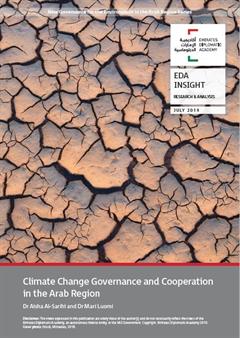 A series of EDA Insights, New Governance for the Environment in the Arab Region has been recently launched. The series explores ways for governments and other regional stakeholders to support stronger regional environmental governance, which is key not only to sustainable development but peace and stability as well (read the series note here).
A series of EDA Insights, New Governance for the Environment in the Arab Region has been recently launched. The series explores ways for governments and other regional stakeholders to support stronger regional environmental governance, which is key not only to sustainable development but peace and stability as well (read the series note here).
The first Insight in the series, authored by Dr Aisha Al-Sarihi and Dr Mari Luomi, examines Climate Change Governance and Cooperation in the Arab Region.
The impacts of climate change do not recognise country borders. Regional governance and cooperation in the Arab region have an important role to play in supporting the implementation of the Paris Agreement on climate change and the UN Sustainable Development Goal 13 (take urgent action to combat climate change and its impacts). It can be particularly advantageous in the areas of: policy coordination and agenda-setting; research and sharing of knowledge and information; technical assistance and capacity building; and leveraging of finance.
Despite some positive developments, the Arab region does not yet have in place any major action-oriented climate initiatives or partnerships. The analysis in this study suggests that a number of weaknesses in the existing regional and sub-regional arrangements have contributed to delaying action on climate change, including: a legacy of weak regional institutions; absence of clear implementation targets, defined roles and follow-up mechanisms; low levels of transparency and accountability of governance activities; limited focus on mitigation; and a siloed approach both within and across institutions.
Arab countries can take advantage of existing regional arrangements, but should work closely together to overcome the main weaknesses identified in this study, including by: enhancing sub-regional cooperation through strategic implementation initiatives; developing detailed regional action plans with clear targets and strategies, and defined roles for implementation, review and follow-up; adopting an integrated approach to climate change and the SDGs in regional governance; improving transparency on relevant regional governance activities and proceedings of meetings; and mobilising Arab development finance institutions to provide sustained funding for regional-level scientific and technical assistance initiatives and implementing climate action.
To read the full version of this paper or the latest EDA publications, please click here.
